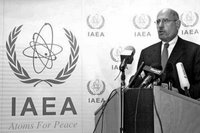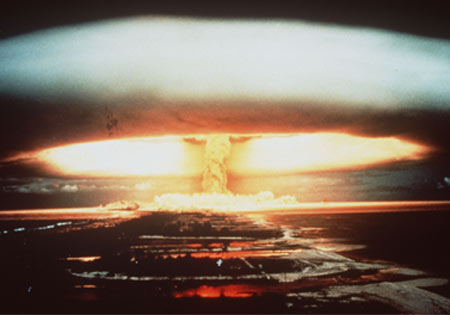Upsetting the apple cart?
 In a June 14 op-ed article in the Washington Post, “Rethinking Nuclear Safeguards”, Mohamed ElBaradei, the Director-General of the International Atomic Energy Agency (IAEA), has stated that “…under the NPT, there is no such thing as a "legitimate" or "illegitimate" nuclear weapons state. The fact that five states are recognized in the treaty as holders of nuclear weapons was regarded as a matter of transition; the treaty does not in any sense confer permanent status on those states as weapons holders.”
In a June 14 op-ed article in the Washington Post, “Rethinking Nuclear Safeguards”, Mohamed ElBaradei, the Director-General of the International Atomic Energy Agency (IAEA), has stated that “…under the NPT, there is no such thing as a "legitimate" or "illegitimate" nuclear weapons state. The fact that five states are recognized in the treaty as holders of nuclear weapons was regarded as a matter of transition; the treaty does not in any sense confer permanent status on those states as weapons holders.”Mr. ElBaradei points out that the three states outside the NPT who have weapons (India, Pakistan and Israel) are not going to give them up and therefore suggests to the international community that “Either we begin finding creative, outside-the-box solutions or the international nuclear safeguards regime [NPT] will become obsolete.”
(Since its creation, the five Nuclear Weapons States (NWS) have touted the NPT as litmus. If you weren’t a NWS by 1968, when this treaty was formalized, you could not have any nuclear weapons. Other countries were coaxed to sign it, which meant that they agreed not to build any nuclear weapons, and, in return, they were given means to run civilian nuclear programs.
The basic premise of the NPT was, and is, that since nuclear power is lethal and dangerous, and not every Tom, Dick and Harry should be allowed to have one. It can be argued that the five NWS wanted to have this nuclear edge in power, and found a way, through NPT, to refuse any more members to this exclusive club. In that sense, the NPT is discriminatory.
This was pointed out by India (and therefore Pakistan too, of course), and it refused to sign the NPT (as did Pakistan, no wonder!). Consequently, after the first nuclear test by India in 1974, the US congress enacted laws that punished India, by refusing it access to nuclear fuel or technology. After the second test in 1998, further restrictions were imposed, and Pakistan joined the sanctions after in followed India in testing its own device.
The fact that the existing NWS were supposed to have progressively reduced their nuclear armaments under the treaty has been overlooked.)
The article tackles the necessity of the US-India nuclear cooperation deal. Under this deal, the United States will amend its laws that will provide waiver specifically to India to exchange nuclear technology.
In addition, the US will lobby the Nuclear Suppliers’ Group (NSG) to export nuclear fuel to India. Further, since India is not a signatory to the NPT, the IAEA will have to come up with India specific safeguards that will allow it to inspect the civilian Indian nuclear reactors.
Mr. ElBaradei is well respected as the head of the IAEA, and enjoys the confidence of all the major powers, including that of the US Administration. He is a qualified international lawyer and an expert in public international law; he and the agency won the 2005 Nobel Peace Prize. Whatever he says carries a lot of weight.
Under the NPT, India and Pakistan are treated as illegitimate NWS. Even though Mr. ElBaradei is correct under the international law, why would he make such a radial statement and not let the illusion legitimacy under the NPT continue? Why would he permit a new interpretation of the NPT?

Especially now, with concerns of proliferation ever higher, the fear of ‘dirty’ bombs getting in the hands of non-state actors soaring, and the reality of ‘dangerous’ countries like North Korea and Iran either already being a NWS or aspiring to become one?
I would very much doubt that he made these statements without the nod of some of the major players. The arguments in the article support the position of the Indian government and the Bush Administration.
Of the five major NWS, only China is the one to lose from India becoming a de facto ‘legitimate’ NWS, because it would dilute its regional supremacy. This, in itself, could be one reason why the other four (UK, France, Russia and US) may want the Indo-US nuclear deal to go through.
Besides, there is a lot of money to be made by private corporations and the governments of the NWS and NSG by transferring technology, selling fuel and building nuclear plants in India. Does Halliburton deal with this stuff too?
The Indo-US deal is now before Congress. It is interesting to note that the Administration is pulling all punches to get it through, despite some early reservations by many representatives of both parties.
Either Mr. Bush wants to be remembered as the President who opened the gateway to India (like Nixon’s China legacy) or he is finally recognizing what the US should have had, a long time ago.

0 Comments:
Post a Comment
Subscribe to Post Comments [Atom]
<< Home